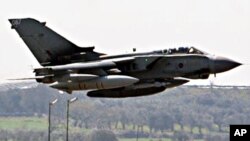NATO warplanes bombed several targets near the Libyan capital Tripoli early Tuesday.
The alliance said the strikes targeted command and control facilities as well as communications infrastructure.
|
In an interview with VOA’s Susan Yackee, William Zartman, professor emeritus with Johns Hopkins’ School of Advanced International Studies, assesses the international coalitions’ operation in Libya:
|
NATO says it also bombed the headquarters of Libya's elite 32nd Brigade which it says has been used to lead and coordinate attacks on civilians.
State-run media says the strikes took place in Tripoli, Libyan leader, Moammar Gadhafi's hometown of Sirte, and the Al-Hira region located southwest of the capital.
The NATO alliance has been carrying out airstrikes against loyalist forces in Libya to enforce the U.N.-authorized no fly zone protecting civilians from attack by Colonel Gadhafi's troops.
On Monday, United Nations and Libyan officials said they have reached a deal to allow aid workers safe passage to the besieged western city of Misrata, but without guarantees from Mr. Gadhafi that his forces will stop shelling the rebel enclave.
A U.N. spokeswoman said Gadhafi agreed to let an international assessment team into Misrata as part of an accord on humanitarian access to the capital, Tripoli, and other Libyan cities. She said the Libyan government will ensure the team's security only in areas under its control.




